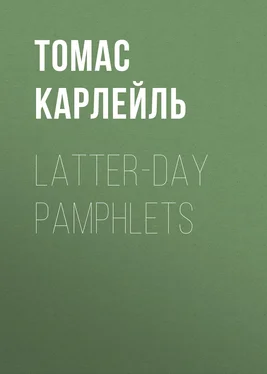Томас Карлейль - Latter-Day Pamphlets
Здесь есть возможность читать онлайн «Томас Карлейль - Latter-Day Pamphlets» — ознакомительный отрывок электронной книги совершенно бесплатно, а после прочтения отрывка купить полную версию. В некоторых случаях можно слушать аудио, скачать через торрент в формате fb2 и присутствует краткое содержание. Жанр: foreign_prose, literature_19, foreign_antique, на английском языке. Описание произведения, (предисловие) а так же отзывы посетителей доступны на портале библиотеки ЛибКат.
- Название:Latter-Day Pamphlets
- Автор:
- Жанр:
- Год:неизвестен
- ISBN:нет данных
- Рейтинг книги:5 / 5. Голосов: 1
-
Избранное:Добавить в избранное
- Отзывы:
-
Ваша оценка:
- 100
- 1
- 2
- 3
- 4
- 5
Latter-Day Pamphlets: краткое содержание, описание и аннотация
Предлагаем к чтению аннотацию, описание, краткое содержание или предисловие (зависит от того, что написал сам автор книги «Latter-Day Pamphlets»). Если вы не нашли необходимую информацию о книге — напишите в комментариях, мы постараемся отыскать её.
Latter-Day Pamphlets — читать онлайн ознакомительный отрывок
Ниже представлен текст книги, разбитый по страницам. Система сохранения места последней прочитанной страницы, позволяет с удобством читать онлайн бесплатно книгу «Latter-Day Pamphlets», без необходимости каждый раз заново искать на чём Вы остановились. Поставьте закладку, и сможете в любой момент перейти на страницу, на которой закончили чтение.
Интервал:
Закладка:
Or perhaps the chief end of man being now, in these improved epochs, to make money and spend it, his interests in the Universe have become amazingly simplified of late; capable of being voted on with effect by almost anybody? "To buy in the cheapest market, and sell in the dearest:" truly if that is the summary of his social duties, and the final divine message he has to follow, we may trust him extensively to vote upon that. But if it is not, and never was, or can be? If the Universe will not carry on its divine bosom any commonwealth of mortals that have no higher aim,—being still "a Temple and Hall of Doom," not a mere Weaving-shop and Cattle-pen? If the unfathomable Universe has decided to reject Human Beavers pretending to be Men; and will abolish, pretty rapidly perhaps, in hideous mud-deluges, their "markets" and them, unless they think of it?—In that case it were better to think of it: and the Democracies and Universal Suffrages, I can observe, will require to modify themselves a good deal!
Historically speaking, I believe there was no Nation that could subsist upon Democracy. Of ancient Republics, and Demoi and Populi , we have heard much; but it is now pretty well admitted to be nothing to our purpose;—a universal-suffrage republic, or a general-suffrage one, or any but a most-limited-suffrage one, never came to light, or dreamed of doing so, in ancient times. When the mass of the population were slaves, and the voters intrinsically a kind of kings , or men born to rule others; when the voters were real "aristocrats" and manageable dependents of such,—then doubtless voting, and confused jumbling of talk and intrigue, might, without immediate destruction, or the need of a Cavaignac to intervene with cannon and sweep the streets clear of it, go on; and beautiful developments of manhood might be possible beside it, for a season. Beside it; or even, if you will, by means of it, and in virtue of it, though that is by no means so certain as is often supposed. Alas, no: the reflective constitutional mind has misgivings as to the origin of old Greek and Roman nobleness; and indeed knows not how this or any other human nobleness could well be "originated," or brought to pass, by voting or without voting, in this world, except by the grace of God very mainly;—and remembers, with a sigh, that of the Seven Sages themselves no fewer than three were bits of Despotic Kings, [Gr.] Turannoi , "Tyrants" so called (such being greatly wanted there); and that the other four were very far from Red Republicans, if of any political faith whatever! We may quit the Ancient Classical concern, and leave it to College-clubs and speculative debating-societies, in these late days.
Of the various French Republics that have been tried, or that are still on trial,—of these also it is not needful to say any word. But there is one modern instance of Democracy nearly perfect, the Republic of the United States, which has actually subsisted for threescore years or more, with immense success as is affirmed; to which many still appeal, as to a sign of hope for all nations, and a "Model Republic." Is not America an instance in point? Why should not all Nations subsist and flourish on Democracy, as America does?
Of America it would ill beseem any Englishman, and me perhaps as little as another, to speak unkindly, to speak unpatriotically, if any of us even felt so. Sure enough, America is a great, and in many respects a blessed and hopeful phenomenon. Sure enough, these hardy millions of Anglo-Saxon men prove themselves worthy of their genealogy; and, with the axe and plough and hammer, if not yet with any much finer kind of implements, are triumphantly clearing out wide spaces, seedfields for the sustenance and refuge of mankind, arenas for the future history of the world; doing, in their day and generation, a creditable and cheering feat under the sun. But as to a Model Republic, or a model anything, the wise among themselves know too well that there is nothing to be said. Nay the title hitherto to be a Commonwealth or Nation at all, among the [Gr.] ethne of the world, is, strictly considered, still a thing they are but striving for, and indeed have not yet done much towards attaining. Their Constitution, such as it may be, was made here, not there; went over with them from the Old-Puritan English workshop ready-made. Deduct what they carried with them from England ready-made,—their common English Language, and that same Constitution, or rather elixir of constitutions, their inveterate and now, as it were, inborn reverence for the Constable's Staff; two quite immense attainments, which England had to spend much blood, and valiant sweat of brow and brain, for centuries long, in achieving;—and what new elements of polity or nationhood, what noble new phasis of human arrangement, or social device worthy of Prometheus or of Epimetheus, yet comes to light in America? Cotton crops and Indian corn and dollars come to light; and half a world of untilled land, where populations that respect the constable can live, for the present without Government: this comes to light; and the profound sorrow of all nobler hearts, here uttering itself as silent patient unspeakable ennui, there coming out as vague elegiac wailings, that there is still next to nothing more. "Anarchy plus a street-constable:" that also is anarchic to me, and other than quite lovely!
I foresee, too, that, long before the waste lands are full, the very street-constable, on these poor terms, will have become impossible: without the waste lands, as here in our Europe, I do not see how he could continue possible many weeks. Cease to brag to me of America, and its model institutions and constitutions. To men in their sleep there is nothing granted in this world: nothing, or as good as nothing, to men that sit idly caucusing and ballot-boxing on the graves of their heroic ancestors, saying, "It is well, it is well!" Corn and bacon are granted: not a very sublime boon, on such conditions; a boon moreover which, on such conditions, cannot last!—No: America too will have to strain its energies, in quite other fashion than this; to crack its sinews, and all but break its heart, as the rest of us have had to do, in thousand-fold wrestle with the Pythons and mud-demons, before it can become a habitation for the gods. America's battle is yet to fight; and we, sorrowful though nothing doubting, will wish her strength for it. New Spiritual Pythons, plenty of them; enormous Megatherions, as ugly as were ever born of mud, loom huge and hideous out of the twilight Future on America; and she will have her own agony, and her own victory, but on other terms than she is yet quite aware of. Hitherto she but ploughs and hammers, in a very successful manner; hitherto, in spite of her "roast-goose with apple-sauce," she is not much. "Roast-goose with apple-sauce for the poorest workingman:" well, surely that is something, thanks to your respect for the street-constable, and to your continents of fertile waste land;—but that, even if it could continue, is by no means enough; that is not even an instalment towards what will be required of you. My friend, brag not yet of our American cousins! Their quantity of cotton, dollars, industry and resources, I believe to be almost unspeakable; but I can by no means worship the like of these. What great human soul, what great thought, what great noble thing that one could worship, or loyally admire, has yet been produced there? None: the American cousins have yet done none of these things. "What they have done?" growls Smelfungus, tired of the subject: "They have doubled their population every twenty years. They have begotten, with a rapidity beyond recorded example, Eighteen Millions of the greatest bores ever seen in this world before,—that hitherto is their feat in History!"—And so we leave them, for the present; and cannot predict the success of Democracy, on this side of the Atlantic, from their example.
Читать дальшеИнтервал:
Закладка:
Похожие книги на «Latter-Day Pamphlets»
Представляем Вашему вниманию похожие книги на «Latter-Day Pamphlets» списком для выбора. Мы отобрали схожую по названию и смыслу литературу в надежде предоставить читателям больше вариантов отыскать новые, интересные, ещё непрочитанные произведения.
Обсуждение, отзывы о книге «Latter-Day Pamphlets» и просто собственные мнения читателей. Оставьте ваши комментарии, напишите, что Вы думаете о произведении, его смысле или главных героях. Укажите что конкретно понравилось, а что нет, и почему Вы так считаете.












